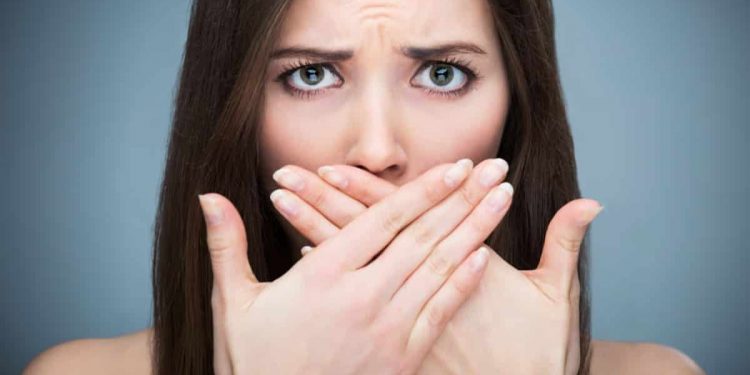Bad breath may indicate dental problems. It is possible to prevent the smell in the mouth in 7 steps with the recommendations of the dentists.
What are 7 effective tips to reduce bad breath? Bad breath, which is a serious problem causes difficulty in communicating in business life, especially by talking.
Dental Treatment Specialists say “Bad breath is a very sensitive issue just like the smell of sweat; People are sometimes reluctant to tell even their favorite ones that their mouth smells, waiting for the person to notice it himself. However, due to the masks that have become a part of our lives with covid-19 infection, there has been a serious awareness about bad breath in patients. Although he often changes masks, the number of patients who say they smell a bad smell independent of what they eat and who present to our clinic with bad breath has increased considerably during the pandemic period.”
Experts who say that there are different causes of bad breath, or halitosis by its medical name, both explained the causes that lead to bad breath and listed effective measures that can be taken; he made important warnings and recommendations.
There are many reasons for bad breath!
When we look at the distribution of halitosis (bad breath) between the sexes, it is seen that although there are different studies, men have it more than women. While the progression of age is a significant factor for increasing bad breath, however, children may also experience bad breath problems, especially during mixed teething periods and throat and tonsil infections. Experts point out that there are pathological and physiological causes of bad breath, explaining these reasons as follows:
- Physiological halitosis; mostly due to eating habits, foods such as onions, garlic, etc. and prolonged starvation and dehydration, while pathological halitosis, which is dangerous, can be caused by some health problems.
- Pathological halitosis; ear, nose and throat diseases, nasal discharges, sinusitis and tonsillitis, reflux, ulcers, gastritis, as well as digestive system diseases; lung and respiratory diseases, chronic kidney failure, diabetes, hematological diseases.
The most common cause is the mouth and teeth!
Mouth and dental health problems are the most common cause of bad breath. So much so that its proportion of all causes reaches 80 percent. Plaques, bacterial layers, mouth-incompatible fillings and gum inflammations accumulated on tooth decay and rotten surfaces are among the most obvious causes of bad breath.
Food accumulated between the teeth causes a stink in the gums. Plaque and tartar that stick to the surface of the teeth first lead to inflammation of the gums; From there, it can spread to the jawbone.
The third molar, called 20-year-old teeth, causes not only confusion, but also bad breath when trying to find its place in the mouth.
Poor oral hygiene, i.e. regular tooth brushing and flossing, are also on the list of the most common causes of bad breath.
Beware of popular diets and sugary diets!
Experts say excessive protein consumption forces our body to burn fat cells for energy, adding: “This process also applies to residues called ketones; therefore, it leads to a smell released by the breath and urinary tract. In the researches, it is stated that vegetarians have less bad breath than those who consume foods of animal origin.
When we look at today’s current dietary models, protein-heavy and ketogenic diets, or prolonged fasting, which we call intermittent fasting, can also lead to bad breath. We advise those who follow such diets to consume plenty of water. Vitamin, mineral deficiencies and decreased saliva flow can also cause bad breath.”
Devices available to measure bad breath
Although bad breath awareness increases with masks, the search for diagnosis and treatment for this problem is not new. Stating that sulfur compounds are measured and halitosis measuring devices that give patients objective information about bad breath levels and causes, the experts said, “Thanks to the measurements made in these devices, we can see why the patient’s bad breath is caused and at what level and we prepare a treatment plan accordingly. We work together with ENT and Gastroenterology physicians when necessary.”

7 simple but effective measures against bad breath!
According to experts, it is possible to prevent bad breath with 7 simple measures to be taken. These measures can be listed as follows;
Regular tooth brushing and interface care
Teeth should be brushed at least twice a day, for two minutes, from the gums to the tooth; in addition, the floss between the teeth where the caries are most commonly used should be cleaned with floss or interface brush. With rechargeable or manual brushes, the surfaces and chewing surfaces of the teeth facing the tongue, palate, cheek should be cleaned.
Tongue brushing
Since a large amount of microorganisms are housed on the surface of the velvety tissue of the tongue, cleaning these microorganisms with special tongue brushes is very important in preventing bad breath. Mouthwashes are also useful in providing a fresh breath due to their antiseptic properties.
Regular dental examination
Teeth of 20 years, which are not pulled in time, can cause pocket formation and odor in the back area. If the intricacy of the teeth is not corrected orthodontically, oral care becomes difficult. It is easier for teeth to rot and gum diseases to form. Preventive dentistry practices, dental stone cleaning with regular dental control twice a year will ensure that all the above-mentioned oral and dental problems are solved without progression and without causing bad breath.
Cleaning of prostheses
Bacteria and fungi may accumulate on prosthetic surfaces that are not cleaned regularly. Stinking can occur with the adhesion of food residual; therefore, prostheses should be cleaned with special brushes and stored in antiseptic solutions.
Abundant water consumption
Drinking plenty of water is useful in combating bad breath. It removes deposits in the mouth and prevents dry mouth.
Avoiding tobacco products and alcohol
Tobacco products and alcohol threaten general health as well as bad breath. Bad breath can also be added to dozens of reasons to quit smoking and alcohol. Add-ons in the mouth due to smoking increase, the accumulation of tartar becomes easier. Smoking causes more insidious progression of gum diseases. Tobacco and excessive alcohol use are also the most important causes of oral cancers.
Biting consumption of vegetables and fruits
During the bite-consuming consumption of foods such as apples and carrots, the increase in saliva increases, and the tooth surfaces are more easily cleaned. Eating by biting berries activates the secretion production of salivary glands. Chewing sugar-free gum can also increase the amount of saliva, preventing bad breath.


